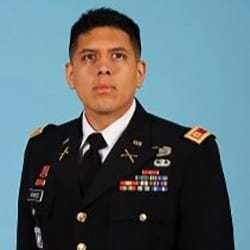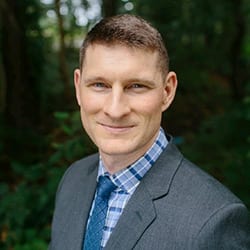By Andrew Cohen
The way Jose Ramos ’18 sees it, the dearth of veterans serving as judicial clerks is as baffling as it is unfortunate. Traits needed to thrive in a judge’s chamber, after all, seem to mirror those developed in the military.
“Veterans are able to focus in on the things that truly matter, and accept and adjust to things that are completely out of their control,” says Ramos, who spent nine years in the Army. “They’ve internalized military values that instill deep integrity, and have often been entrusted with great responsibilities in the face of life and death circumstances. Veterans can also quickly develop the skills to assess and adapt to situations, and make time-sensitive decisions. Most importantly, they’re resilient and not easily discouraged.”

Berkeley Law’s Career Development Office (CDO) helps veterans pursue clerkships, an effort buoyed by another common aspect of military personnel—the desire to give back. A growing number of alumni veteran former clerks are paying it forward, advising other vets in the school community who are eager to follow that path.
Clerkship applications are competitive and complex, making such input highly beneficial. CDO Deputy Director Eric Stern and Professor John Yoo facilitate connections with former veterans such as Jefferson Harwell ’14, who clerked on the Texas Supreme Court and two federal courts before joining O’Melveny’s Los Angeles office.
Ramos calls Harwell “a tremendous mentor” for identifying prospective judges who had served in the military or hired veterans in the past. Harwell also reviewed Ramos’ resume and cover letters, provided guidance about interviewing, and helped him plan the first Bay Area Law School Veteran’s Network Reception on March 8.
Federal Judge Charles Breyer ’66 (Northern District of California) is another veteran Ramos describes as “an incredible role model” for sharing what judges look for in clerkship candidates. This fall, Ramos will begin clerking for federal judge and former Marine Otis Wright II (Central District of California).
“My three deployments to Afghanistan exposed me to extreme violence,” says Ramos, who led and trained a 40-man platoon during combat operations there. “I couldn’t stop the perpetual forces of motion that inflict violence. What I could do is use the knowledge I’d gained to pursue a legal career in order to help resolve conflicts through negotiation and adjudication rather than violence and war.”
A team effort
Ramos, Harwell, and another veteran in Harwell’s office are helping 2L Nathan Keller ’19 navigate the tricky clerkship application maze. Ramos is even “regularly checking on my progress,” Keller says.
Such feedback is “particularly useful because veterans often have difficulty translating their experience into terms easily understood by employers,” Keller explains. “Also, there aren’t many veterans in the legal field. … Simply knowing that other vets have been successful in a very competitive field has helped reassure me that I stand a good chance of being successful as well.”
A Marine from 2011-2016, Keller spent two years in the Nuclear Weapons Security unit and seven months shuffling between Kuwait and Iraq supporting operations against ISIS. A Justice Studies major in college, he greatly appreciates the sense of purpose the Marine Corps instilled.
“What I didn’t like, though, was that each person is necessarily part of a larger whole, without the agency to individually effect change,” Keller says. “Being a lawyer seemed like a great way to have the power to step in when something was wrong, rather than rely on policy decisions made a thousand miles away.”

Greg Adams ’13, who attended Berkeley Law while on active duty in the Marines, will start clerking for federal Judge Trevor McFadden (District of Columbia) in July 2019 while transitioning to the Marine Corps reserves. He received “incredible help” from Harwell and Gabe Podesta ’10, who served in the Air Force and is now clerking for federal Judge George Wu (Central District of California) in Los Angeles.
“Veterans have a lot to offer: a wealth of professional and personal experience to draw upon, discipline, leadership, and the mission-first attitude that’s instilled beginning on our first day of training,” Podesta says. “But perhaps our most important attribute is our commitment to service. Every member of the federal judiciary is a public servant and can relate, even if the day-to-day military experience seems quite foreign.”
Now general counsel at the Marine Corps, Adams became interested in clerking after learning that many lawyers whose careers he wanted to emulate had that experience—and after hearing other former clerks rave about it.
He says the advice he gleaned from fellow veterans and others at Berkeley Law “was extremely encouraging and helped set me on the right path to my eventual success. I was overwhelmed by the unconditional generosity of my professors and fellow alumni during my application process, and I love to share the same advice that I received.”